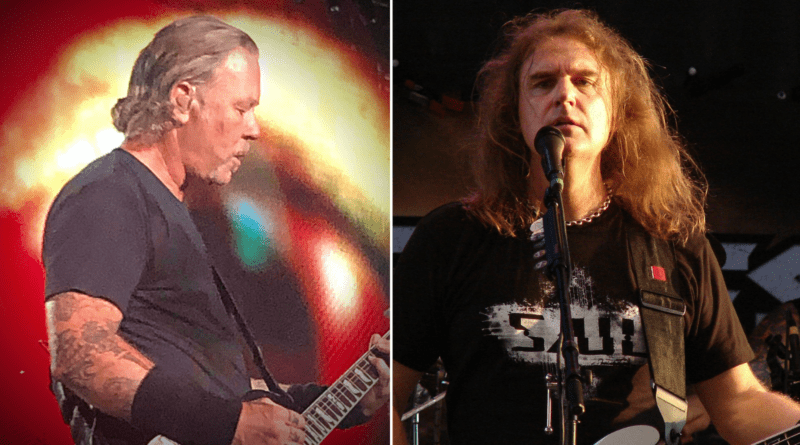Recently, bassist David Ellefson, famous for his work in Megadeth, appeared on the I Ask No One podcast to discuss his work and career. Ellefson, who’s now working with Kings of Thrash, playing old Megadeth songs, was asked about Metallica and their legendary 1991 self-titled record, famously known as the “Black Album,” and whether it helped or hurt the genre of metal.
According to Ellefson, Metallica’s impact was nothing but positive, even calling them the leaders in the musical movement. He replied (transcript via Blabbermouth):
“Ah, it frickin’ broke the doors down. Metallica were always the leader. They broke all the doors down to every obstacle in the way of heavy metal.”
Of course, as Ellefson continued to discuss the issue, he pointed out the impact that other older bands had on Metallica, ultimately making this huge impact. He continued:
“To some degree, Iron Maiden, before them, had superseded and became an arena act and done this stuff too, so certainly you’ve gotta give credit to Maiden. “
“And even Def Leppard, to some degree, because they started out as just kind of a grungy little heavy metal band out of Sheffield, and then they [went] on to become essentially almost like a pop act, on some level; I mean, they became that big.“
“Those guys — certainly Def Leppard and Maiden — deserve credit for sort of carving the initial path to sort of the big-time mainstream path for heavy metal.“
Nonetheless, according to David, it’s still Metallica that was instrumental in this massive change in the world of music for spearheading metal in the modern culture. Sure, it’s a bit controversial coming from a former Megadeth member, but one could argue that Ellefson is free from Dave Mustaine. And we all know what Mustaine thinks of Metallica. Anyhow, Ellefson continued:
“But then Metallica came in, and they just fucking [said], ‘We’re here. We’re coming in.’ They really broke through every obstacle with MTV and daytime rotation with their videos and just became a household name.“

“And it’s cool, because they have ‘metal’ in their name, so it’s not like there’s any ‘what is this?’ It’s, like, come on. It says ‘metal’ right in it. You know what it is.”
“And they didn’t clean it up and pretty it up; they just kept it raw and frickin’ grungy and in your face and it was, again, authentic. So, again, the likes of Lemmy [of Motörhead], who influenced Lars [Ulrich, Metallica drummer] and the guys, that inspiration that stayed true, that, ‘We don’t have to…'”
Going deeper into it, David Ellefson also pointed out how Metallica always did things their own way. Playing by the rules, as he adds, was not really their thing, no matter what people thought. He continued:
“I remember with Metallica, it was always the thing: ‘We do our own thing. We don’t play by the rules.’ And to a large degree, they didn’t.“
“And that’s, I think, what made it appealing to the fans, because, let’s face it, heavy metal is kind of working man’s music, and that’s why we look to our heroes, because they’re, like, ‘God, I wish I could my boss to fuck off and just go do that, ’cause these guys can do whatever they want.’ That’s the message, right?”
As mentioned above, David Ellefson is currently involved, among other projects, in Kings of Thrash. The band also features another ex-Megadeth member, guitarist Jeff Young who played with the band on the 1988 record “So Far, So Good… So What!” and its supporting tour. The group also collaborates with other ex-Megadeth members, including guitarist Chris Poland.
In another recent interview, David Ellefson looked back on how plenty of old-school thrash metal bands are still around, particularly those from the San Francisco Bay Area, and how they’re still making great music. Reminded of that, he said:
“That is a really good point, and I’ve thought the same thing. Okay, so, like Exodus ‘Bonded By Blood’, certainly that was their ‘Kill ‘Em All’, it was their ‘Killing Is My Business’, it was them sort of grabbing the reins of that mountain.”
“Because the truth of it is, look, Metallica moving up to San Francisco to get Cliff Burton in the band. Obviously, once they put roots down there, that’s when that thing really grew. But there first, before anybody, was Exodus.”
“They were really the kings of that. And as much as they were kind of in the background to the quick advancement of Metallica, Exodus is — I mean, that’s the seed from which it all germinated in a lot of ways.”
“I think Exodus, Testament… Testament’s made some of their better records in the last decade, I think. And I love ‘Souls of Black’. I love the early stuff; they’re cool. I love listening to ’em. They’re very ambient. Cool sounds.”
“But, yeah, I think some of the more vicious and ferocious music from all those bands, I think they’ve all come recently… I saw, even in the 2000s… Look, Lamb of God, for sure, was one of the big leaders.”
“And look, part of it was because we no more had a Pantera, and Lamb of God kind of came in and took the throne. But they always pointed toward Megadeth in particular, and, of course, Metallica and the ‘Big Four.’”
While discussing the issue, Ellefson also talked about how rough the 1990s were for all the classic metal bands, especially thrash metal. He also singled out Lamb of God as a band that “reset” the genre. He offered:
“The ’90s were not easy on thrash metal. Testament [and some of the other bands], they didn’t fall off the grid, but they went very underground as a way to survive. Megadeth and Metallica, because of our size, we were able to maintain a little bit better.”
“But by the 2000s, man, it was the younger bands, like Lamb of God in particular, those guys really helped reset thrash metal.”
“Music is always driven by the younger generation; they are the ones who are always creating the new stuff. And in metal, what we always find is… Even the shredder generation, of which Mark Tremonti [Alter Bridge guitarist] would be a good example.”
“As famous as he is, and he was in a big kind of modern rock band, in his heart he’s a frickin’ shredder. ‘So Far, So Good… So What!’ is his favorite album.”
“But these guys took what we were doing and then advanced it. So by the time their bands became popular, suddenly shredding was cool, because this new generation of guitar players loves these techniques that… They took the stuff from what we were doing and then they just advanced it and made it even more complex and jaw-dropping.”
“And we need that, man — we need the next generation behind us to keep reinventing this stuff. ‘Cause otherwise — we’re not gonna go on forever; the train runs out of track and then it’s over.”
Photos: Carter Sterling (David Ellefson), Good Will Hunting (Metallica-Warsaw-2019 06)


